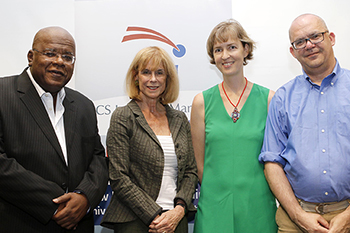Latest News Archive
Please select Category, Year, and then Month to display items
26 January 2022
|
Story Rulanzen Martin
|
Photo University of the Western Cape
 The late Prof Jaap Durand.
The late Prof Jaap Durand.
The management of the University of the Free State (UFS) is saddened to learn of the passing of Prof Jaap Durand, revered theological academic and author. Prof Durand obtained his master’s degree from the UFS and received an honorary doctorate in Philosophy from the UFS in 2004.
Prof Durand has had a colourful career as academic, writer, and struggle activist: from Professor of Systematic Theology and Dean of the Faculty of Theology at the University of the Western Cape to Deputy Vice-Chancellor of the same university. He also served as the ombudsman of Stellenbosch University from 2002 to 2003.
During his life, Prof Durand was a unifier and a critical voice, speaking out against injustice. He has also authored several books, including Dit is amper dag; Evolusie, wetenskap en geloof, and Protesstem.
The UFS joins the higher education community in mourning and is deeply saddened by the loss of such a great theologian and academic. We wish to convey our deepest condolences to Prof Durand’s family, friends, and loved ones during this time.
UFS hosts first ACS Institute held on African soil
2015-12-08

The first ever Association for Cultural Studies (ACS) Institute hosted on the African continent is taking place on the Bloemfontein Campus. At the event are, from the left: Prof Jonathan Jansen, Vice-Chancellor and Rector of the UFS; Prof Jean Comaroff, Alfred North Whitehead Professor of African and African-American Studies and Anthropology at Harvard University; Prof Helene Strauss, Chair of the Department of English at the UFS; and Prof Gil Rodman, Chair of the Association for Cultural Studies and Professor of Communication Studies at the University of Minnesota.
Photo: Johan Roux
|
The University of the Free State (UFS) is hosting the 2015 conference of the Association for Cultural Studies (ACS) Institute – the first time for this international event to take place on the African continent.
From 7 – 12 December 2015, some of the world’s leading scholars in cultural studies are taking part in the conference on the Bloemfontein Campus. The event has been organised by the UFS Department of English in collaboration with colleagues from other departments in the Faculty of the Humanities.
The ACS is the foremost international association for scholars in cultural studies, and has been hosting the biennial Crossroads in Cultural Studies Conference since 2006. In 2011, the ACS held its inaugural institute at the University of Ghent (Belgium), followed, in 2013, by one at the Alpen-Adria University Klagenfurt (Austria). As the 2015 meeting of the institute is the first to be held in Africa, the organisers aim at highlighting the contributions that scholars from our continent and other (post)colonial contexts have made to cultural studies, even as it engaged many of the long-standing theoretical concerns generated for the field by scholars from the Global North.
Themed ‘Precarious Futures’, the conference explores how cultural studies might assist in charting more equitable futures by reflecting critically on the cultural, economic, and political trajectories within which precariousness – a state increasingly anticipated for the planet – might be altered. Experts in a diversity of disciplines are sharing their perspectives in the form of seminars and lectures.
Keynote lectures are delivered by Prof Jean Comaroff (Harvard University), Prof John Erni (Hong Kong Baptist University), Dr Jo Littler (City University London), Dr Zethu Matebeni (University of Cape Town), and Prof Handel Kashope Wright (University of British Columbia).
In her opening lecture on Monday 7 December 2015, Prof Comaroff addressed the challenging relationship of law, detection, and sovereignty in contemporary African polities within the South African post-apartheid context.
Topics discussed include climate change; the archives of everyday life; cross-racial intimacies; ethnography; meritocracy; cultural studies and human rights; China and globalisation; gender, sexuality, and race; and governance, embodiment and the work of care.